![]() |About|News|Products|Prices|Solutions|Support|Registration|Services|Jobs|Contacts|Home|
|About|News|Products|Prices|Solutions|Support|Registration|Services|Jobs|Contacts|Home| ![]()
SYNOLOGY NAS (network storage), integrated file sharing/mail/ftp/web server products 

- Synology NAS servers prices (Lithuania) ;
- SUPERMICRO serveriai , darbo stotys ;
MATRIX UAB as official Synology reseller, presents information on these products. The most popular products are Synology DiskStaion DS109+, DS209+, DS409+, which are really integrated small servers, based on Linux. They have accordingly 1, 2 or 4 slots for hard disks, and are supporting RAID levels up to 5. In near future they will become popular, because of small size, quiet, silent (green) operation, and having all the server features, including e-mail server up to 30 users and print server. Synology uses PowerPC and ARM CPU in its devices.
In general, most of the Synology devices have the same set of features and or capabilities (some of the lower end models do not feature the security capabilities which the higher end models have to offer, such as SSL or ADS capabilities). The differences between all of the models mainly lie in the amount of performance or storage capacities which are required by the user. All products have an Ethernet and USB port, while some models feature an eSATA port for connecting External Hard Drives. By default, users purchasing a Synology NAS do not come with Hard Drives; these will have to purchase separately.
The ability of Synology’s servers evolves over time, as Synology aims to release new capabilities to each of their products. However, the primary purpose of the Synology product is to expand or supplement the storage needs of the user, using the Network Attached Storage structure. Along with expanding storage, the Synology server is capable of performing data back up purposes for Windows users, or to backup to other Synology/Rsync servers, using the RSync Protocol. Along with these basic necessities, the Synology server is capable of multimedia streaming via the UPnP protocol or it can behave as Print Server. And finally, with its integrated Apache, MySQL, and PHP engines, the Synology Server is capable of being a light-weight web server, or perhaps a small Blog server.
Mail
Station (email sever) is the new feature available for the Disk Station
Manager 2.1. The Synology Disk Station can act as an e-mail server via
Mail Station. It provides four protocols, including POP3, POP3 SSL/TLS,
IMAP, and IMAP SSL/TLS. You have to enable at least one protocol to
receive or deliver mails through e-mail clients such as Outlook
Express. You can also use the built-in webmail to receive and send
e-mails. Mail Station (mail server) software supports the following Synology models :
DS-106j, DS109j, DS109, DS109+, DS209j, DS209, DS209+, CS407e, CS407, DS409+, DS509+, RS407, RS409+, RS409RP+
Synology DiskStaion DS109+ Speedy 1-bay SATA NAS Server for Small-and-Medium Business Users
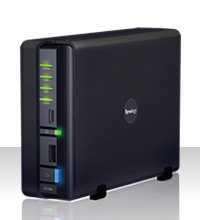
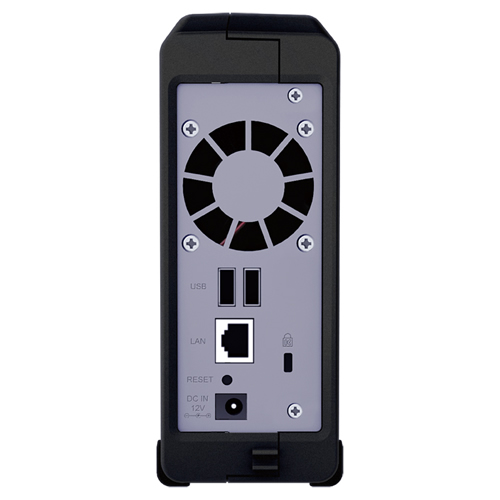 Synology Disk Station DS109+ offers PC server equivalent performance
for efficient data sharing and backup. Its high performance coupled
with sophisticated Synology Disk Station Manager 2.1 provides an ideal
solution for cross platform sharing, secure server backup, Windows ADS
integration, business mail server, and corporate surveillance.
Synology Disk Station DS109+ offers PC server equivalent performance
for efficient data sharing and backup. Its high performance coupled
with sophisticated Synology Disk Station Manager 2.1 provides an ideal
solution for cross platform sharing, secure server backup, Windows ADS
integration, business mail server, and corporate surveillance.
* High Speed
50+ MB/Sec Windows Write
51+ MB/Sec Windows Read
* Windows + Mac + Linux
* Power Saving (12W~21W)
Management & Backup
When User Home is enabled, Synology Disk Station DS109+ automatically
creates a home folder for every user account to provide each user with
a private space to store data. This eliminates the need for the
administrator to repeatedly create shared folders and user accounts.
Synology Network Backup allows users to back up files from one to
another Synology Disk Station or any rsync-compatible server, the Local
Backup allows backups to external hard drives via USB or eSATA, both
providing flexible scheduling options.
Secure File Sharing
Synology File Station 2 simplifies file management with a web browser
by introducing Windows-style user's interface and advanced features
including drag-n-drop, sub-folder privilege settings, multiple files
upload and download, and remote unzip features.
HTTPS provides a secure way for Internet access. When it's enabled,
connections to the web-based Web Station, Photo Station 3, File Station
2, Surveillance Station 2, and Audio Station are all secured with
SSL/TLS.
FTP service over SSL/TLS encryption ensures file sharing at a high
security level. Unicode, write-only and sophisticated bandwidth
management are also supported.
Office Applications
Synology Mail Station add-on provides a one step installation and
enables Synology Disk Station to be a mail server that supports
Outlook-like Web mail, SMTP, POP3, and IMAP.
Synology Surveillance Station 2 enables Synology Disk Station DS109+ to
be an economical network video recording (NVR) solution. Over 130
popular IP cameras of varying brand names are supported.
Eco Friendly
Synology Disk Station is designed and developed perpetually with the
concept of energy saving. Compared with average PC counterparts,
Synology Disk Station DS109+ consumes a relatively low amount of power
and hibernates when not in use. This not only helps to save energy but
also extends the lifespan of the hard disk.
Additionally, all Synology products are produced with RoHS compliant
parts and packed with recyclable packing materials. Synology recognizes
its responsibility as a global citizen and is continually working to
reduce the environmental impact of the products we create.
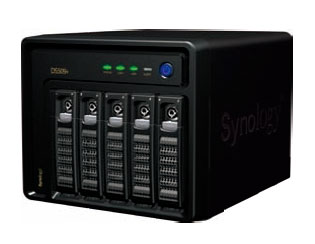
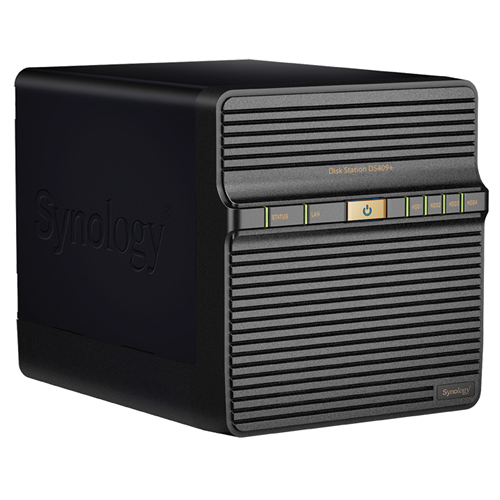
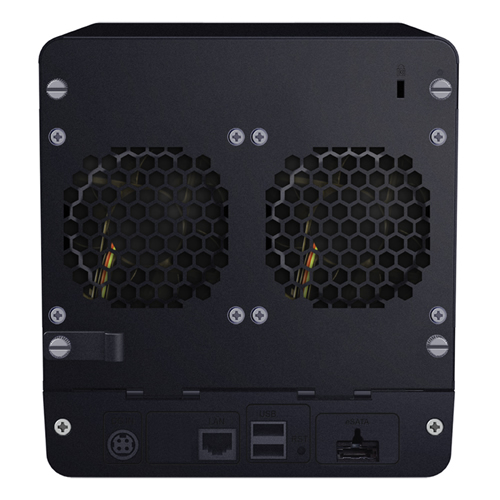
Synology might not be as well known in the U.S. as other
network-attached storage (NAS) device manufactures such as Buffalo,
Maxtor/Seagate, or QNAP; but with Synology's announcement today of a
slew of new NAS devices for small businesses and home users, Synology
NAS devices might be finding their way into many more U.S. companies
and homes soon.
Leading off the pack of the new NAS devices is Synology's new
"flagship" business-class device, the Disk Station DS509+. The DS509+
features five hot-swappable SATA-II drive bays with RAID 0/1/5/6
support. Synology claims that the DS509+ is "ideal for growing
businesses looking for automated secure server backups, cross platform
file sharing, mail server capabilities and a built-in surveillance
system for under $1000."
Synology also claims that the DS509+ is a "high-performance" NAS
solution: Synology states that you can expect RAID 5 read
performance at speeds greater than 55MB/Sec and RAID 5 write
performance at 39MB/Sec or better. The DS509+ is powered by a 1.06GHz
CPU and 1GB of RAM; it has two Gigabit Ethernet ports, two USB 2.0
ports, and 1 eSATA connection. The device supports up to a total of
7.5TB of storage space; includes CIFS, Samba, AFP 3.1, FTP, NFS,
Telnet/SSH, and ADS support; it has iTunes server and UPnP multimedia
streaming support; and it supports up to 2,048 user accounts, 256 user
groups, 256 shared folders, and up to 512 concurrent connections.
There is no word on when the DS509+ will be available, but Synology has
announced that a four-drive-bay version, the Disk Station DS409+
(pictured top right), will be available in April. The DS409+ has
similar specs as the DS509+--it has the same speed CPU with half the
on-board memory (512MB), but it has faster rated speeds at 57+MB/Sec
RAID 5 read and 41+MB/Sec RAID 5 write. There will also be another
four-bay version available in April, the Rack Station RS409+, which
will come in a rack-mountable 1-U format, with redundant power
supplies. A single-bay Disk Station DS109+ will be available in May,
and a two-bay Disk Station DS209+ will be available later in the
summer. Prices have not been announced yet for these models.
Also coming soon will be DX5 and RX4 eSATA-based expansion models. The
DS409+, DS509+, and RS409+ all include built-in eSATA connections for
simple scalability or dedicated backup. The five-bay DX5 is similar to
the Desk Station's form factor and is meant to attach to the DS409+ or
DS509+; while the four-bay RX4 comes in a rack-mountable chassis that
is designed to connect to the RS409+. Synology states that connecting a
DX5 or RX4 device is very simple: "One step eSATA plug-in allows the
DX5/RX4 to connect to the Disk Station, and function almost
immediately. No additional software installation is required."
Unfortunately, Synology has not stated availability or pricing yet for
these products either.
Synology also has a line of "entry-level" NAS devices for home and
small workgroup environments, which it is adding to with the new
single-bay Disk Station 109j and the two-bay Disk Station 209j--the
DS109j will sell for less than $150, and both units will be available
in April. Synology states that these devices represent "an economical
solution to file sharing, managing photos, streaming media, website
hosting and data backup." Synology's existing entry-level "j" series
includes the single-bay IDE-based Disk Station DS106j and the
single-bay SATA-II-based Disk Station DS108j. It is not certain yet
what new features the DS109j will bring, but the 209j will be
Synology's first dual-bay NAS device for the entry-level "j" series;
although the company's existing dual-bay Disk Station DS207 does appear
to cater to this same market segment.
Synology also recently announced the Disk Station 2.1 firmware update
for its existing product lineup. The new firmware brings a number of
new and improved features to existing devices, including an enhanced
AJAX-based interface, mail server capabilities, support for up to two
USB-connected printers, sub-folder privilege settings, and RAID
migration. In addition to coming pre-installed on all new devices, the
2.1 firmware update is also available for free for existing supported
models.
Copyright MATRIX, UAB 2009 - 2015
![]()